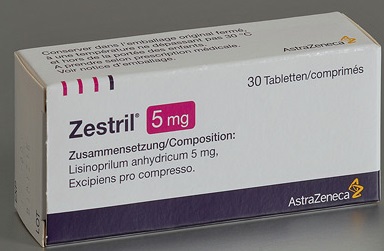Contents
What is Zestril?
Zestril is a Brand name for a drug containing lisionopril as an active ingredient.
Lisinopril is an ACEI – angiotensin-converting enzyme inhibitor drug that antagonizes the effect of the renin–angiotensin–aldosterone system – RAAS, by blocking the actions of angiotensin converting enzyme (ACE) keeping Angiotensin I from being converted to Angiotensin II. The inhibition of RAAS system causes an overall decrease in blood pressure.
It is used primarily in therapy of high blood pressure, symptomatic treatment of congestive heart failure, together with thrombolytic drugs, aspirin and with β-blockers to improve survival after myocardial infarction, for health conditions after heart attacks and for prevention of diabetic nephropathy in hypertensive patients with diabetes mellitus and microalbuminuria.
Zestril is available only in form of tablets and film coated tablets in the following doses: 2.5, 5, 10, 20, 30 and 40 mg.
Other common Brand names on the market for drugs containing lisinopril as an active ingredient are: Prinivil, Tensopril and Hipril.
This drug can be also used in combination with other drugs such as: Lisinopril and Hydrochlorthiazide, Prinzide, Zestoretic (containing Lisonopril and Hydrochlorthiazide) and Lytensopril-90 (containing L- Arginine and Lisinopril).
What is in Ibuprofen?
Ibuprofen is a nonsteroidal anti-inflammatory drug (NSAID). Ibuprofen is a generic name for a drug containing the same name active ingredient.
It is used as a pain reliever for various conditions such as: headaches, dental pain, muscle pain, tendinitis (inflammation or irritation of a tendon, a thick cord that attaches bone to muscle), menstrual cramps, and for the treatment of pain, swelling and joint stiffness caused by arthritis, osteoarthritis, juvenile arthritis, bursitis, ankylosing spondylitis, psoriatic arthritis and gout.
It can also be used to temporarily reduce fever and for the treatment of common cold symptoms. Ibuprofen may be used intravascular with opiates for relieving moderate to severe pain. Ibuprofen lysine may be also used intravscular as a therapy for premature neonates with ductus arteriosus.
Ibuprofen is available in following dosage forms and strengths: capsule, capsule liquid filled, capsule coated (200, 220 and 400 mg), injection (100mg/ml), oral liquid (100 mg/5mL and 50 mg/1.25mL), solution (100 mg, 100 mg/5mL), suspension (100 mg, 200 mg/10mL, 100 mg/5mL) and tablet (200, 300, 400, 600 and 800 mg).
Ibuprofen brand names
Common Brand names for ibuprofen are:
- Advil,
- Motrin,
- Brufen,
- Calprofen,
- Genpril,
- Ibu,
- Midol,
- Nuprin,
- Cuprofen,
- Nurofen,
- Ibuprofen 800 and PediaCare Children’s Pain Reliever/Fever Reducer IB.
How does Zestril and Ibuprofen work in the body?
Lisinopril is a potent ACE inhibitor drug that antagonizes the effect of the renin–angiotensin–aldosterone system – RAAS, by blocking the actions of angiotensin converting enzyme (ACE) keeping Angiotensin I from being converted to Angiotensin II.
The inhibition of RAAS system causes an overall decrease in blood pressure. The RAAS system is a homeostatic mechanism that regulates the balance of hemodynamics, water and electrolytes.
When renal blood pressure or blood flow is reduced or during sympathetic stimulation, granular cells of the juxtaglomerular apparatus in the kidneys release renin.
In the blood, renin converts circulating inactive angiotensinogen to angiotensin I – ATI, which is subsequently degraded to angiotensin II – ATII by angiotensin converting enzyme – ACE.
ATII can increase blood pressure using many mechanisms. ACE is also involved in the bradykinin enzymatic deactivation, which is known vasodilator.
By inhibiting the deactivation of bradykinin, increased bradykinin levels can sustain further the effects of lisinopril by causing increased vasodilation and decreased blood pressure.
Elevated bradykinin level after ACE inhibitor administration can cause: dry cough, and inflammation-related pain, angioedema, rash and hypotension.
Ibuprofen inhibits synthesis of prostaglandins (substances in the body that play a key role in pain and inflammation processes in body tissues) by inhibiting at least 2 cyclooxygenase (COX) isoenzymes, COX-1 and COX-2.
Inhibition of COX-2 leads to the anti-inflammatory, analgesic and antipyretic effects while the inhibition of COX-1 may cause gastrointestinal bleeding and ulcers.
Ibuprofen has the lowest risk of causing gastrointestinal bleeding of all NSAID, producing balanced inhibitory effects on both COX-1 and COX-2 isoenzymes.
But, this advantage is lost at high doses. This drug may also inhibit chemotaxis, decrease proinflammatory cytokine activity, alter lymphocyte activity, and inhibit neutrophil aggregation.
Can patients take Zestril and Ibuprofen together?
Patients should talk with their doctor first before using Zestril together with ibuprofen. Combination of these two drugs may reduce the effects of Zestril in lowering blood pressure. In addition, these drugs may impact kidney function, especially when they are used together frequently or chronically.
Patients are more likely to develop impaired kidney function during treatment with these drugs if patients are also using or if patient is elderly or have preexisting kidney disease. Patients may need a dose adjustment or more frequent monitoring by doctor for safely use of both medications.
Patients should contact their doctor if they experience signs and symptoms that may suggest damage of kidney such as: vomiting, nausea, increased or decreased urination, loss of appetite, fluid retention, swelling, sudden weight gain or weight loss, shortness of breath, weakness, dizziness, confusion, muscle cramps, tiredness, and irregular heart rhythm.
The table below shows the incidence of side effects after Zestril and Ibuprofen administration in recommendable doses. The incidence can be increased if these drugs are taken together or overdosed.
| Very common side effects >10% | Dizziness (5-12%) |
| Common side effects 1-10% | Cough (4-9%), Epigastric pain (3-9%), Heartburn (3-9%), Nausea (3-9%) Dizziness (3-9%), Tinnitus (3-9%), Rash (3-9%), Headache (4-6%), Diarrhea (3-4%), Hyperkalemia (2-5%), Chest pain (3%), Fatigue (3%), Hypotension (1-4%), Nausea/vomiting (2%), Kidney disease in patients with AIM (2%), Rash (1-2%), Headache (1-3%), Vomiting (1-3%), Edema (1-3%), Fluid retention (1-3%), Constipation (1-3%) |
| Rare side effects <1% | Psoriasis, Angioedema, Immune hypersensitivity reaction, Acute renal failure, Atrial fibrillation, Hypersomnia, Bone marrow suppression, Anuria, Arthralgia, Alopecia, Pancreatitis, Cutaneous pseudolymphoma, Atrial tachycardia, Mood changes, Skin infections, Leukopenia |
Special precautions and warnings during Zestril and Ibuprofen administration:
- Patients should tell their doctor and pharmacist if they are allergic to lisinopril or any other ACEI drugs such as: captopril (Capoten), fosinopril (Monopril), enalapril (Vasotec, in Vaseretic), perindopril (Aceon), quinapril (Accupril, in Accuretic, in Quinaretic), benazepril (Lotensin, in Lotrel), moexipril (Univasc, in Uniretic), ramipril (Altace), and trandolapril (Mavik, in Tarka) or any other medications or any of ingredients in lisinopril tablets.
- Patients using Zestril should tell their doctor if they have diabetes and if they are taking drug aliskiren (in Amturnide, Tekturna, Tekamlo, Tekturna HCT). Doctor will probably tell not to take lisinopril if patients have diabetes and if they are also taking aliskiren.
- Patients should also tell their doctor and pharmacist what prescription and nonprescription medicines, nutritional supplements, vitamins, and herbal products they are taking. They should mention if they are using any of the following drugs: aspirin and indomethacin (Indocin, Tivorbex), diuretics, lithium (Lithobid) and potassium supplements. Doctor may need to change the doses of these medications or monitor carefully for side effects.
- Patients using Zestril should mention their doctor if they have or have ever had some heart or kidney disease, diabetes, lupus or scleroderma.
- If patients are having surgery, including dental surgery, they should tell doctor or dentist that they are taking Zestril.
- It is important to know know that diarrhea, vomiting, or any cause of dehydration can cause a drop in blood pressure, causing lightheadedness and fainting.
- Patients using ibuprofen should mention to their doctor if they are using following drugs: other ACE inhibitors such as: enalapril (Vasotec), fosinopril (Monopril), lisinopril (Prinivil), benazepril (Lotensin), captopril (Capoten), moexipril (Univasc), diuretics lithium (Eskalith, Lithobid) and methotrexate (Rheumatrex). Doctor may need to change the doses of these medications or monitor more carefully for side effects.
- Patients should not take nonprescription ibuprofen with any other analgesic unless doctor tells that should.
- Patients should tell their doctor if they have or have ever had any of following conditions such as: asthma, frequent stuffed or runny nose or nasal polyps, swelling of the inside of the nose, swelling of the arms, feet, ankles, hands, or lower legs; lupus or liver or kidney disease.
“Eliquis versus Warfarin – Which is Best?”
“Can Azithromycin be used in combination of Rifampin?”
“Is It Safe to Take Tylenol (Acetaminophen) with Advil or Motrin?“


